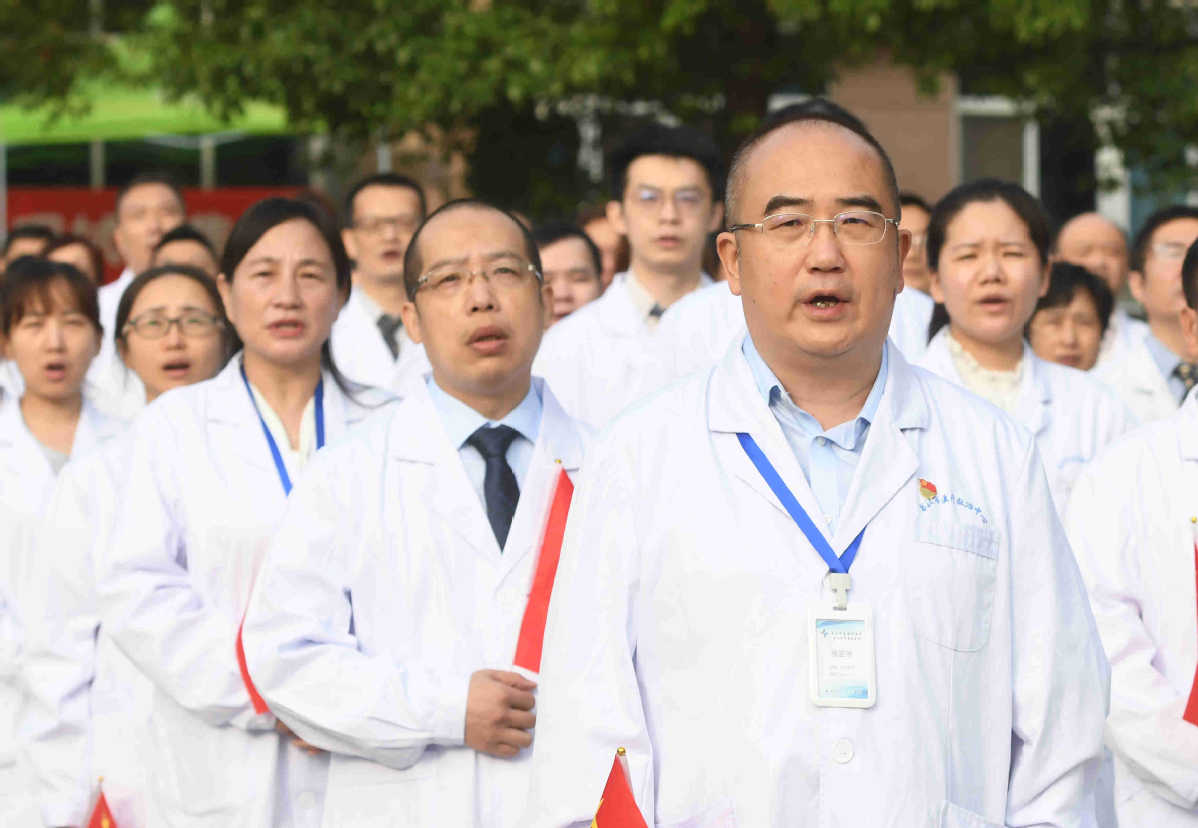Doctor battled own illness to fight COVID-19






Wuhan doctor Zhang Dingyu knew he had to race against time-and his own illness-to save patients from the COVID-19 epidemic when it struck the city last year.
Head of Wuhan Jinyintan Hospital-one of the city's major battlefields in the fight against the epidemic-at the time, Zhang and his colleagues treated more than 2,800 COVID-19 patients, many of whom were severely or critically ill.
He faced a struggle of his own. Zhang has ALS, also known as Lou Gehrig's disease, which means he will gradually lose muscle strength and eventually become paralyzed and unable to speak, move, swallow or even breathe.
In September, he received the national honorary title, "the People's Hero," for his outstanding contributions to the country's fight against COVID-19, yet Zhang said he does not consider himself a hero, just one of many who contributed to the fight.
The first seven cases of 'pneumonia with an unknown cause' were transferred to Jinyintan Hospital on Dec 29, 2019, and Zhang and his colleagues have been on high alert since.
Jinyintan was the only hospital in Wuhan that specialized in infectious diseases. As different hospitals in the city started to report patients with pneumonia symptoms, Zhang knew that a major battle was coming.
As the situation worsened, many hospital's cleaners and security guards left their posts out of fear, so Zhang asked administrative workers and Party members to step in and take their place.
The sense of urgency made the doctor even more short-tempered than usual. "Faster! Faster!" His loud voice could be heard in wards and corridors.
He would not hesitate to scold doctors and nurses for not moving quickly enough or for not answering his questions regarding patients in time. However, he himself was not able to move as fast as he used to and would often stumble and limp.
Colleagues noticed, and Zhang finally told them about his illness at a staff meeting in late January last year. "I have ALS," he told them. "The doctor has told me I might only live for another six or seven years, and my legs have started to atrophy."
"I am sorry if I have been more harsh with you recently, but we must run faster and race against time to save more patients, even if it means we sacrifice our own lives."
Many colleagues were moved to tears as Zhang bowed to them, to apologize for his short temper. Jia Chunmin, a nurse in the hospital, could not believe he was so ill because he walked so quickly.
"No one can keep up with him in the battle against the new virus," she said.
Like most of his colleagues, Zhang also lived in his car during the most critical period, going to bed at about 1 am and getting up at about 6 am. He had a stick used by mountain climbers in his car trunk to help him walk after an exhausting day at work.
When he was too tired to work or his leg hurt too much, he would lie down on his office couch and video chat with his wife, Cheng Lin. As they joked about the day's work, Zhang would fall asleep and rest for a while.
After working around the clock for 22 days, he received the news that his wife had been diagnosed with COVID-19 while working at another hospital in Wuhan.
Zhang was too busy to visit her and was only able to spend half an hour with her three days after she was hospitalized.
"I feel very guilty. Perhaps I'm a good doctor, but not a good husband," he said. Luckily, his wife recovered.
The fight against COVID-19 was not the first time Zhang has stood on the front line of epidemics or disasters.
He led a medical team from Hubei to save victims of the Wenchuan earthquake in 2008, and he worked at a Pakistani hospital in 2011 as the first Doctor Without Borders from Hubei.
"As a Party member, doctor and former dean of a hospital, at critical times there is no call for me to back down. I have to rise to the challenge," he said. "Being able to work and help others is a blessing."
Everyone made sacrifices in the fight against the epidemic, whether it was for their freedom or personal benefit, and that is how the country won the battle, he said.
- China's CR450: A new era of high-speed rail at 400 km/h
- TAN SUO SAN HAO to pioneer future of deep-sea exploration
- Xi's discourses on Chinese modernization published in Japanese
- Officials summoned over alleged garbage bin food served to students
- Caring hearts help to enhance quality special education
- Xi sends condolences to South Korean acting president over plane crash
































